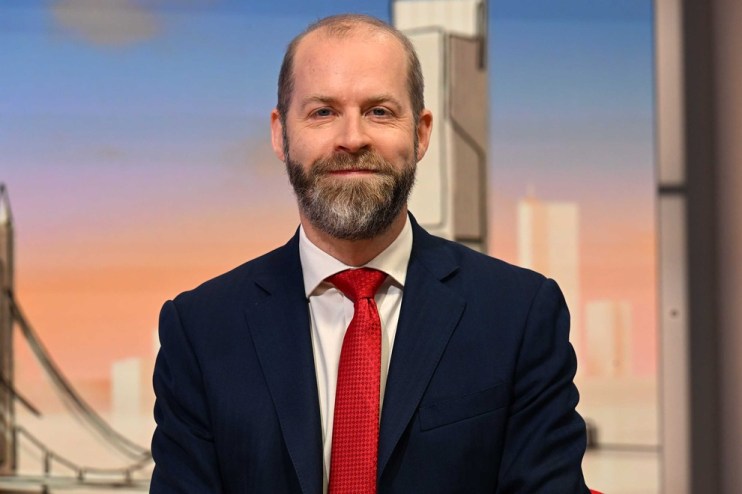The City sees the Tories as a ‘bigger risk to business’, says Reynolds

The Conservative Party is seen by many people in the City “as the bigger risk to the business community”, Labour’s Jonathan Reynolds told City A.M.
Speaking in a wide-ranging interview ahead of his party’s conference from this weekend, the shadow business and trade secretary insisted Labour had a “far more compelling offer” to firms, from what he called an “unrecognisable party” from four years ago.
The Greater Manchester MP said: “I was told by a very senior figure in the City just a few weeks ago that, in their view, there was no political risk attached from the point of view of the City or businesses to the potential election of a Labour government.
“Actually, many people are genuinely more worried about a fifth term of the Conservative Party if it happens.
“I do think many people look to the Conservative Party as the bigger risk to the business community.”
Labour’s offer to firms has gone beyond the so-called ‘scrambled eggs offensive’, as Sir Keir Starmer and Rachel Reeves round of high powered business breakfasts has been dubbed.
“I do think many people look to the Conservative Party as the bigger risk to the business community.”
Jonathan Reynolds
Efforts to create an industrial strategy council – on a footing with the Office for Budget Responsibility or the Climate Change Committee – and work around the green prosperity plan, planning reform, apprenticeships and the National Grid, show, Reynolds says, how Labour “are prepared to listen and work with businesses in a way the government just isn’t”.
On HS2 and net zero, the shadow minister is clear Labour would restore the ban on sales of new petrol and diesel cars to 2030 – but less certain around the future of northern transport.
The government has been accused of a “scorched earth” policy by limiting platforms at Euston, building flats and selling off the land it purchased to build the line to Manchester – which would, Reynolds says, “effectively prevent the second stage ever going ahead”.
It is, he says, “an almighty mess”, adding: “I can’t make the promise that we can reverse that because of what we are seeing. I’m incredibly sad and angry about it. We’ll work with everyone to salvage this but as it stands I just don’t know what we can salvage at this stage.”
Reynolds, who was the former City minister when Jeremy Corbyn led the Labour Party, said he had “relished” his previous role, building relationships with firms across the Square Mile, including with Confederation of British Industry (CBI) chief executive Rain Newton-Smith.
“Most weeks I find myself in the City for one reason or another,” he said. “And I feel very comfortable there. I think the City is often misunderstood.
“If we want people to have good retirements, you need a good pension system, you need good asset managers. If you want people like myself to own their own homes, you need mortgages, you need a banking sector that will deliver.
“Insurance, protecting people against risks from which they alone could not manage – these are essential. People talk about the real economy and these are pretty real issues.”
He admits the CBI has faced “significant problems”, but holds Newton-Smith in “very high personal esteem” and is “in touch” and “engaged” with the organisation.
Reynolds adds: “I do think there is a need for a CBI organisation and the role it plays… things that have always played a significant role in the economy and in the political system.”
“Most weeks I find myself in the City for one reason or another… and I feel very comfortable there.”
Jonathan Reynolds
Labour, he says, shares Newton-Smith’s belief that “the number one thing people want is stability… Rain is absolutely right”.
The industrial strategy council, an independent organisation, is the “premise” of the party’s pitch to stability; an attempt to enshrine security for firms beyond the vagaries of politics.
Setting up the “institutional arrangements”, the argument is, means when cabinet ministers “come and go”, the core principles, policies and established knowledge remain consistent.
The messy business of actual politics, however, remains crucial to actually ever getting to make this happen.
Naturally, Reynolds, who has represented his northern constituency of Stalybridge and Hyde since 2010, welcomed the result of the Rutherglen and Hamilton West by-election, which saw Labour snatch the seat from SNP with a swing of more than 20 per cent with elation.
“We’re obviously delighted… it’s a win of historic proportions,” he said. But – true to Labour’s message – he quickly added that there was “no complacency whatsoever… we are incredibly humble about what has needed to happen to make us competitive.”
And that competitive streak is evident – emphatic, even – when talking about Chancellor Jeremy Hunt’s claim that the Tories were the “party of business”.
Reynolds said: “This conference will make absolutely clear beyond the shadow of a doubt that it is Labour that is the party of business. We’ve doubled the places on our popular business day.”
Reynolds slammed the discussion of “conspiracy theories” and “fringe internet nonsense”, such as concerns around ‘15-minute cities’, at the Conservative Party conference last week.
“This is not what business wants to hear. It is genuinely worrying for the future,” he said.
But he insists: “We couldn’t say we’re the party of business just because of what the Conservatives have done wrong.”
It will therefore be up to Reynolds, and his Labour colleagues, to deliver a party conference that makes business believe the party can do what is right for business.
